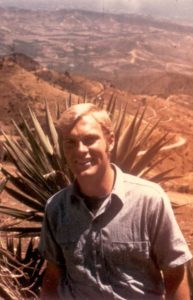Mark Walker Comment on Paul Theroux’s Insights On Self-Radicalization
Paul Theroux’s Insights On Self-Radicalization
By Mark D. Walker (Guatemala 1971-73)
•
Theroux’s article is one of most informative and insightful pieces written on the self-radicalization to terrorist groups like ISIS and the Taliban. He harkens back to his own Peace Corps experience as a young volunteer unaware of what he was getting into by supporting an opposition group in Malawi. He compares this experience to that of John
Walker Lindh who has been called a traitor when his idealism, according to Theroux, is deep in the American experience. Theroux compares his naivety at 24 with that of Lindh who converted to Islam when he was 16 and after studying at a madrasa in Pakistan joined the Afghan Army in 2001. In the case of Theroux’s misdeeds he was threatened with detention, expelled from the country as an undesirable alien, thrown out of the Peace Corps and fined. In both cases Theroux and Lindh were “way over their heads.”
Lindh’s mission, like Theroux’s, was to help those he perceived as oppressed. He was motivated by stories of human rights abuses by the Northern Alliance. Theroux points out that “you become radicalized when you think that the world has ceased to care.” But unlike Theroux, he accepted a plea agreement with the U.S. government and was sentenced time in a federal penitentiary where he was brutalized.
Like a true RPCV, Theroux goes beyond pointing out an injustice, but suggests that President Obama commute his sentence. He strengthens his point by reminding us that Bill Clinton had pardoned Marc Rich, who made secret deals with the ayatollah to become a “blood-money” billionaire. Rich’s ex-wife had provided considerable gifts to the Clinton Library as well, so this pardon was based on self-interest at best.
Theroux’s insights are an excellent example of how our Peace Corps experience informs our worldview and what we consider humane and just. He is undoubtedly one of the most respected RPCV authors, best known for such stories as The Mosquito Coast and most recently Deep South: Four Seasons on Back Roads that is a great read told only as an RPCV used to trekking into the most isolated areas for the true story and reality. His article, “Pardon the American Taliban” can be found in the Sunday October 23, 2016 issue of the New York Times.
Or, copy and paste this URL into your browser: http://nyti.ms/2esqFEZ
•
Mark Walker (Guatemala 1971-73) implemented fertilizer experiments in Guatemala and Honduras, although his most important accomplishment was a wife and three children, all born in Guatemala. Following an MA degree in Latin American Studies from the University of Texas in Austin, Mark co-founded a Guatemalan development agency and then managed child sponsorship programs for Plan International in Guatemala, Colombia and Sierra Leone. Mark has written and spoken in English and Spanish at a number of global conferences, including the Hemispheric Congress for Fundraising in Mexico, and has held senior fundraising positions for several groups like CARE International, MAP International, Make A Wish International and was the CEO of Hagar. Most recently, he completed a fundraising study for the National Peace Corps Association as a VP at Carlton & Co. His involvement promoting “World Community Service” programs led to receiving the most prestigious “Service Above Self” award from the Rotary International Foundation, and all three of his children would participate in Rotary’s “Youth Exchange” program. He is completing his own memoir, “ Different Latitudes: My Life in the Peace Corps and Beyond.” Mark and his wife, Ligia, live in Scottsdale, Arizona close to their three children and six grandchildren.

Theroux’s analysis is critically important in understanding how young people can become radicals. However, Lindh is no longer a young idealist. He is a man who has been in prison for his actions. The question I ask is would he still be potentially dangerous if he were pardoned? I don’t believe that prison has led him to embrace the United States and its policies.
I believe that the President may have some options. If he were to commute Lindh’s sentence, but not pardoned him, he would be free, but still subject to monitoring. I think that would be fair.
Joanne–good point and that option sounds reasonable. I hadn’t heard of Lindh’s actual situation in prison and this would impact the extent to which letting him go makes sense–or as you point out under what circumstances. Cheers, Mark